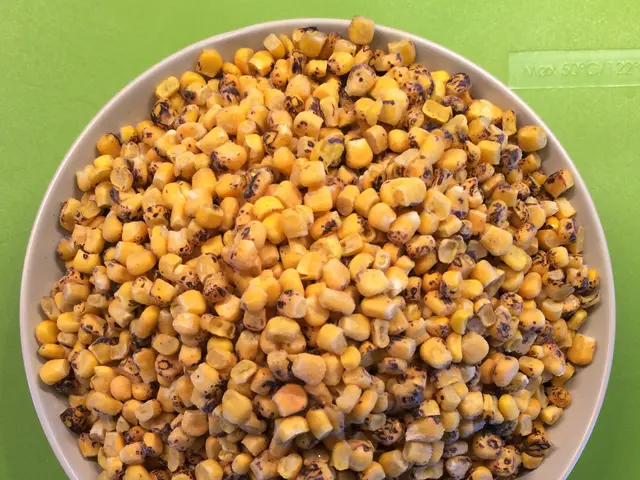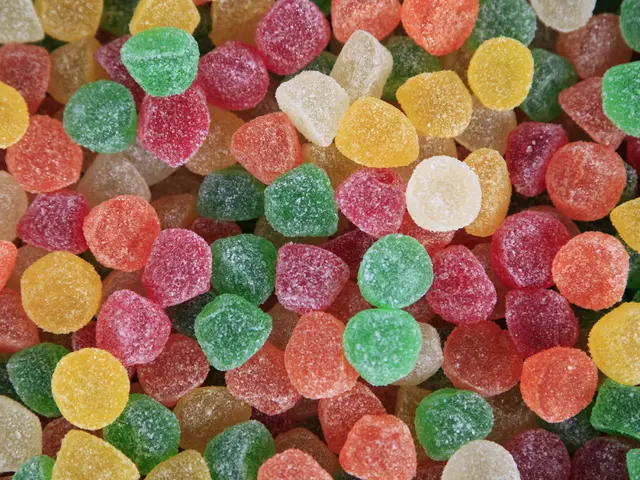Foods Beneficial for ADHD Management: Exploring the Optimal Diet for Attention Deficit Hyperactivity Disorder
Transform your child's diet with the best foods for managing ADHD symptoms! A well-balanced diet is vital for maintaining a healthy brain and supporting optimal cognitive function. Here's what you need to know:
Diet Conquerors: A Handy Guide to ADHD-Friendly Foods
1. Snack Smart
Make room for these snacks that cater to your little one's needs:
Non-Sweet Hyper Less Spread: A savory spread that reduces hyperactivity in kids and teens, free of preservatives and palm oil. Rich in Ayurvedic herbs, nuts, seeds, and brain protecting antioxidants, this concoction can be added to a variety of dishes.
Brain Booster Premium Dates Choco Spread (500gm): Dating back to memory improvement, speech development, and easing eye contact issues, this yummy spread is a brain booster delight for kids. It's packed with Omega-3, DHA, walnuts, dates, nuts, seeds, and herbs like Ashwagandha, Shankhapushpi, and Brahmi.
2. Veggies and More
Ensure your child gets their daily dose of these nutrient-rich delights:
Brain Booster Veggies and Dal Powder: A natural, gluten-free, and dairy-free mix that's packed with Omega-3, Vitamin D, Vitamin K, Sage herb, vegetables, sprouted dals, and greens. Just mix it with flour, dosa batter, or veggies for a tasty brain boost!
Kids & Teens Brain Booster Chocolate Spread: A tasty, gluten-free, and dairy-free chocolate spread enriched with ingredients that improve memory, focus, and autism. A delicious and healthy snack that can be eaten directly or with milk or roti.
The Unhealthy Deniers
To keep ADHD symptoms at bay, steer clear of:
- Sugary Foods: High in sugar, these foods can trigger a rollercoaster ride of fluctuating blood sugar levels, leading to difficulty focusing.
- Simple Carbohydrates: Moderate intake of white bread, pasta, sugary cereals, and refined grains, as they can contribute to blood sugar imbalances and reduced cognitive function.
- Unhealthy Fats: Avoid saturated and trans fats found in fried foods, fast food, and processed snacks as they can negatively impact brain health.
- Caffeine: While small amounts can improve focus, excessive consumption may lead to restlessness, anxiety, and disrupted sleep patterns.
A Balanced Plate for Every Brain
To support your child's cognitive health, aim for a rainbow of colorful fruits and vegetables, whole grains, lean proteins, healthy fats, and adequate hydration. Strive to limit unhealthy food choices to ensure a balanced and nourishing diet.
By providing the right fuel for your child's brain, you'll support their focus, attention, memory, and overall well-being! Be the Diet Ninja, and let food conquer ADHD together!
Enrichment Data:
When it comes to ADHD-friendly diets, featuring nutrient-dense foods is paramount. Here's a quick snapshot of recommended food groups and their benefits:
Powerful Food Groups for ADHD Care
1. Omega-3 Rich Foods
- Examples: Cold-water fish like salmon, walnuts, flaxseeds.
- Benefits: These foods promote brain health due to their omega-3 fatty acids that support brain cell structure and function[1].
2. Protein-Rich Foods
- Examples: Eggs, lean meats, legumes, nuts, and seafood.
- Benefits: These foods provide the necessary amino acids for balancing neurotransmitters essential for mood, focus, and attention[2].
3. Complex Carbohydrates
- Examples: Whole grains, oats, quinoa, and vegetables.
- Benefits: These provide a sustained energy source and can help stabilize blood sugar levels, leading to improved focus[2].
4. Antioxidant-Rich Foods
- Examples: Berries, spinach, nuts.
- Benefits: These foods combat oxidative stress, minimizing brain damage and supporting overall cognitive health[3].
5. Fibrous Foods
- Examples: Lentils, chia seeds, barley, apples, and legumes.
- Benefits: Soluble fiber keeps the gut microbiome healthy, promoting gut-brain axis communication vital for emotional regulation and cognitive function[4].
Watch Out for These
- Simple Carbohydrates: Omitting white bread, pastries, processed food, and refined sugars can help maintain stable blood sugar levels and support cognitive performance.
- Food Additives: Water those ADHD behaviors down by keeping food colorings, preservatives, MSG, aspartame, nitrites, and artificial flavors at bay.
- Caffeine: Although small amounts can boost focus, excessive consumption may lead to anxiety, restlessness, and sleep problems[5].
Embrace these power plates to tackle ADHD symptoms and enhance your child's cognitive function!
- To enhance brain development and support optimal cognitive function, consider adding Non-Sweet Hyper Less Spread and Brain Booster Veggies and Dal Powder to your child's diet.
- For a snack that promotes focus and memory, opt for the Brain Booster Premium Dates Choco Spread or Kids & Teens Brain Booster Chocolate Spread.
- To maintain a healthy lifestyle and manage weight, limit intake of sugary foods, simple carbohydrates, unhealthy fats, and caffeine.
- A well-balanced diet rich in nutrient-dense foods, such as omega-3 rich foods, protein-rich foods, complex carbohydrates, antioxidant-rich foods, and fibrous foods, can help improve focus, attention, memory, and overall well-being for children with ADHD.
- To explore various options and cultural influences, engage in healthy cooking with recipes featuring global cuisines like Italian, Indian, Chinese, and more.
- Mental health and fitness-and-exercise play crucial roles in managing ADHD symptoms; ensure your child maintains a regular exercise routine and develops good mental health habits.
- Skin-care is an essential aspect of overall health-and-wellness; encourage your child to develop a proper skincare routine and mindful eating practices for a balanced and nourishing lifestyle.








